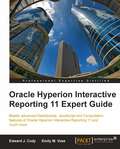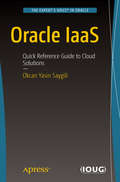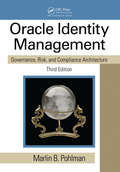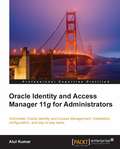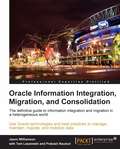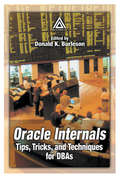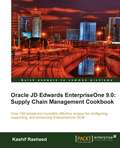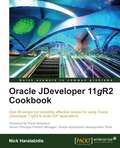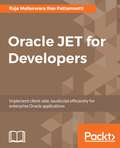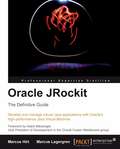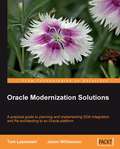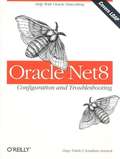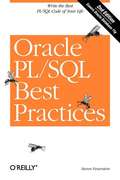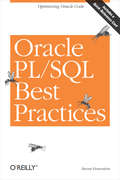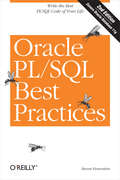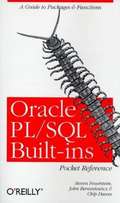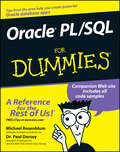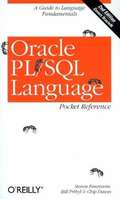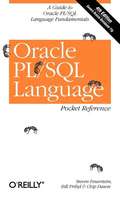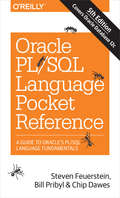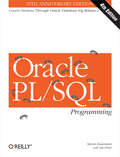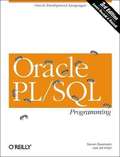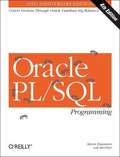- Table View
- List View
Oracle Hyperion Interactive Reporting 11 Expert Guide
by Edward J. Cody Emily M. VoseThis book is written in a simple, easy to understand format with screenshots, code samples, and step-by-step explanations that will guide you through the advanced techniques used by the experts. If you are an Oracle Hyperion Interactive reporting user or developer looking to become an expert in the product, then this book is for you. You will require a basic knowledge of Interactive Reporting, as this book starts with a brief overview and then dives into advanced techniques, functions, and best practices. Beginner users should consult The Business Analyst's Guide to Oracle Hyperion Interactive Reporting 11 to gain insight on the software product.
Oracle IaaS
by Okcan Yasin SaygiliFollow this guide that explains Oracle's Infrastructure as a Service (IaaS) cloud solution and the tools and capabilities that can help you increase business value, productivity, and performance. You will learn about economic advantages as well as elasticity, unlimited storage, and on-demand capacity computing. Oracle IaaS: Quick Reference Guide to Cloud Solutions covers Oracle's service structure as well as its cloud service offerings and cloud models. It provides detailed guidance regarding the advantages of the specific models, as well as how to create and manage each service. This book contains many real-world case studies, including how to build and configure compute resources to fit the needs of your specific organization. IaaS product offerings covered in this book include: Oracle Compute Cloud Oracle Storage Cloud Oracle Ravello Cloud Oracle Container Cloud What You'll Learn Understand Oracle IaaS products and Oracle Cloud Compare existing Oracle cloud products Discover IaaS new features Master Oracle Cloud Architecture Who This Book Is For Oracle database administrators, Oracle developers, and other developers looking to build cloud-based applications.
Oracle Identity Management: Governance, Risk, and Compliance Architecture, Third Edition
by Marlin B. PohlmanIn the third edition of this popular reference, identity management specialist Marlin B. Pohlman offers a definitive guide for corporate stewards struggling with the challenge of meeting regulatory compliance. He examines multinational regulations, delves into the nature of governance, risk, and compliance (GRC), and outlines a common taxonomy for the GRC space. He also cites standards that are used, illustrating compliance frameworks such as BSI, ITIL, and COBIT. The text focuses on specific software components of the Oracle Identity Management solution and includes elements of the Oracle compliance architecture.
Oracle Identity and Access Manager 11g for Administrators
by Atul KumarThis book is written in a simple, easy to understand format with lots of screenshots and step-by-step explanations. If you are an IDAM or database administrator looking to carry out administration tasks right that begin with installation,and configuration, then this guide is for you. You need not have any prior administration skills to get started with this book.
Oracle Information Integration, Migration, and Consolidation
by Tom Laszewski Jason WilliamsonThis enormously practical guide, interspersed with numerous real-life case studies and actual business scenarios, shows readers when, where, and how to use Oracle's wide range of data integration products. If you are a DBA, application or data architect, or data integration specialist who is running an Oracle database or middleware and you want to learn about the latest on Oracle's information integration platform, then this book is for you. You can also benefit from this book if you are an application developer or technical and project lead with a focus on master data management, data warehousing, and data consolidation. You should have working experience with Oracle Database, data integration, consolidation, and migration, as well as some familiarity with integration middleware products and information service buses.
Oracle Internals: Tips, Tricks, and Techniques for DBAs
by Donald K. BurlesonIf you are a typical Oracle professional, you don't have the luxury of time to keep up with new technology and read all the new manuals to understand each new feature of the latest release from Oracle. You need a comprehensive source of information and in-depth tips and techniques for using the new technology. You need Oracle Internals: Tips, Tricks, and Techniques for DBAs. Oracle has evolved from a simple relational database into one of the most complex e-commerce platforms ever devised. It's not enough for you to understand just the Oracle database. You must also understand the components of the Web server technology, XML, Oracle Security, Oracle and Java, and a host of other issues in order to do your job properly. This book is a compendium of the best and most useful articles from Oracle Internals, Auerbach Publications' newsletter for Oracle database administrators and other Oracle professionals. Edited by Oracle guru Don Burleson, it provides the type of in-depth, highly technical information not found in any other book, information only available from peers and consultants. The chapters focus on the truly tough stuff - proven techniques learned in the trenches. You could get this information from other sources, but you'd have to hunt and peck for it. Can you afford that kind of time? Oracle Internals: Tips, Tricks, and Techniques for DBAs gives you knowledge and advice directly applicable to your work in one easy-to-use resource.
Oracle JD Edwards EnterpriseOne 9.0: Supply Chain Management Cookbook
by Kashif RasheedA cookbook full of practical and immediately useable recipes for real world business implementation of EnterpriseOne Supply Chain Management. If you are a functional consultant, technical consultant/developer, or project manager and want to improve your business perspective of EnterpriseOne SCM, this book is for you. You should have basic knowledge of navigating EnterpriseOne and general supply chain familiarity. Knowledge of the Common Foundation JDE 9.0 module is advantageous; the supply chain business domain knowledge will be an add-on to this.
Oracle JDeveloper 11gR2 Cookbook
by Nick Haralabidis"Oracle JDeveloper 11gR2 Cookbook" is a practical cookbook which goes beyond the basics with immediately applicable recipes for building ADF applications at an intermediate-to-advanced level. If you are a JavaEE developer who wants to go beyond the basics of building ADF applications with Oracle JDeveloper 11gR2 and get hands on with practical recipes, this book is for you. You should be comfortable with general Java development principles, the JDeveloper IDE, and ADF basics
Oracle JET for Developers
by Raja Malleswara PattamsettiClient side JavaScript for enterprise Oracle applications. About This Book • Develop resilient and robust client-side applications • Explore the power of popular JavaScript libraries such as jQuery, RequireJS, and custom Oracle JavaScript libraries • Integrate JavaScript for Oracle developers • Easily debug and secure your cloud interfaces Who This Book Is For If you are a web components developer looking to create client-side apps that are resilient and robust using Oracle JET, then this book is the right choice for you. What You Will Learn • Use Yeoman or npm to start a new Oracle JET-based project • Implement real-world use cases using Oracle JET components • Get to know the best practices for Oracle JET web applications • Explore Knockout.js, the framework behind Oracle JET • Implement a multi-platform app with OJ and Cordova In Detail This book will give you a complete practical understanding of the Oracle JavaScript Extension Toolkit (JET) and how you can use it to develop efficient client-side applications with ease. It will tell you how to get your own customized Oracle JET set up. You'll start with individual libraries, such as jQuery, Cordova, and Require.js. You'll also get to work with the JavaScript libraries created by Oracle, especially for cloud developers. You'll use these tools to create a working backend application with these libraries. Using the latest Oracle Alta UI, you'll develop a state-of-the-art backend for your cloud applications. You'll learn how to develop and integrate the different cloud services required for your application and use other third-party libraries to get more features from your cloud applications. Toward the end of the book, you'll learn how to manage and secure your cloud applications, and test them to ensure seamless deployment. Style and approach This book will have a practical step by step approach where every step of application development will be explained in detail with code samples.
Oracle JRockit: The Definitive Guide
by Marcus Hirt Marcus LagergrenFilled with careful step-by-step instructions and plenty of screenshots, this tutorial shows you JRockit and how to get the most from it. All key concepts in the JRockit JVM, such as code generation, memory management and other internals are introduced. Performance aspects of Java are discussed in detail. A complete guide to use the tools in the JRockit Mission Control suite is also included, and much more. This book is for intermediate to advanced Java Developers, who want to monitor, diagnose, profile and enhance the performance of their Java applications. It is also for people who want to understand more about the internal workings of a modern Java Virtual Machine or adaptive runtime. Parts of the book are suitable as course material for education about runtimes.
Oracle Modernization Solutions
by Tom Laszewski Jason WilliamsonThis book combines case studies with practical examples of how to implement modernization techniques using Oracle (and partner) products to modernize to the Oracle Platform. The book also weighs the pros and cons of specific modernization use cases. Finally, we explore some of the emerging trends in technology and how they apply to legacy modernization. Legacy system architects, project managers, program managers, developers, database architects and decision makers who own mainframe and heterogeneous systems, and are tasked with modernization will all find this book useful. The book assumes some knowledge of mainframes, J2EE, SOA, and Oracle technologies. The reader should have some background in programming and database design.
Oracle Net8 Configuration and Troubleshooting
by Jonathan Gennick Hugo ToledoDescribes everything DBAs need to know to install configure, tune, and troubleshoot Net8, Oracle's networking technology. It covers the Oracle Internet Directory (OID), Oracle Names; the Multi-Threaded Server (MTS); and the Oracle Connection Manager, as well as the Oracle networking utilities (lsnctl, namesctl, cmctl, tnsping, Net8 Assistant, Net8 Easy Config, and Net8 Configuration Assistant). In addition, it provides networking troubleshooting techniques, commonly encountered Net8 configuration problems,
Oracle PL/SQL Best Practices, 2nd Edition
by Steven FeuersteinIn this compact book, Steven Feuerstein, widely recognized as one of the world's leading experts on the Oracle PL/SQL language, distills his many years of programming, teaching, and writing about PL/SQL into a set of best practices-recommendations for developing successful applications. Covering the latest Oracle release, Oracle Database 11g, Feuerstein has rewritten this new edition in the style of his bestselling Oracle PL/SQL Programming . The text is organized in a problem/solution format, and chronicles the programming exploits of developers at a mythical company called My Flimsy Excuse, Inc., as they write code, make mistakes, and learn from those mistakes-and each other. This book offers practical answers to some of the hardest questions faced by PL/SQL developers, including: What is the best way to write the SQL logic in my application code? How should I write my packages so they can be leveraged by my entire team of developers? How can I make sure that all my team's programs handle and record errors consistently? Oracle PL/SQL Best Practices summarizes PL/SQL best practices in nine major categories: overall PL/SQL application development; programming standards; program testing, tracing, and debugging; variables and data structures; control logic; error handling; the use of SQL in PL/SQL; building procedures, functions, packages, and triggers; and overall program performance. This book is a concise and entertaining guide that PL/SQL developers will turn to again and again as they seek out ways to write higher quality code and more successful applications. "This book presents ideas that make the difference between a successful project and one that never gets off the ground. It goes beyond just listing a set of rules, and provides realistic scenarios that help the reader understand where the rules come from. This book should be required reading for any team of Oracle database professionals." --Dwayne King, President, KRIDAN Consulting
Oracle PL/SQL Best Practices, 2nd Edition
by Steven FeuersteinOracle PL/SQL Best Practices summarizes PL/SQL best practices in nine major categories: overall PL/SQL application development; programming standards; program testing, tracing, and debugging; variables and data structures; control logic; error handling; the use of SQL in PL/SQL; building procedures, functions, packages, and triggers; and overall program performance.
Oracle PL/SQL Best Practices: Optimizing Oracle Code
by Steven FeuersteinIn this book, Steven Feuerstein, widely recognized as one of the world's experts on the Oracle PL/SQL language, distills his many years of programming, writing, and teaching about PL/SQL into a set of PL/SQL language "best practices"--rules for writing code that is readable, maintainable, and efficient. Too often, developers focus on simply writing programs that run without errors--and ignore the impact of poorly written code upon both system performance and their ability (and their colleagues' ability) to maintain that code over time.Oracle PL/SQL Best Practices is a concise, easy-to-use reference to Feuerstein's recommendations for excellent PL/SQL coding. It answers the kinds of questions PL/SQL developers most frequently ask about their code:How should I format my code?What naming conventions, if any, should I use?How can I write my packages so they can be more easily maintained?What is the most efficient way to query information from the database?How can I get all the developers on my team to handle errors the same way?The book contains 120 best practices, divided by topic area. It's full of advice on the program development process, coding style, writing SQL in PL/SQL, data structures, control structures, exception handling, program and package construction, and built-in packages. It also contains a handy, pull-out quick reference card. As a helpful supplement to the text, code examples demonstrating each of the best practices are available on the O'Reilly web site.Oracle PL/SQL Best Practices is intended as a companion to O'Reilly's larger Oracle PL/SQL books. It's a compact, readable reference that you'll turn to again and again--a book that no serious developer can afford to be without.
Oracle PL/SQL Best Practices: Write the Best PL/SQL Code of Your Life
by Steven FeuersteinIn this compact book, Steven Feuerstein, widely recognized as one of the world's leading experts on the Oracle PL/SQL language, distills his many years of programming, teaching, and writing about PL/SQL into a set of best practices-recommendations for developing successful applications. Covering the latest Oracle release, Oracle Database 11gR2, Feuerstein has rewritten this new edition in the style of his bestselling Oracle PL/SQL Programming. The text is organized in a problem/solution format, and chronicles the programming exploits of developers at a mythical company called My Flimsy Excuse, Inc., as they write code, make mistakes, and learn from those mistakes-and each other.This book offers practical answers to some of the hardest questions faced by PL/SQL developers, including:What is the best way to write the SQL logic in my application code?How should I write my packages so they can be leveraged by my entire team of developers?How can I make sure that all my team's programs handle and record errors consistently?Oracle PL/SQL Best Practices summarizes PL/SQL best practices in nine major categories: overall PL/SQL application development; programming standards; program testing, tracing, and debugging; variables and data structures; control logic; error handling; the use of SQL in PL/SQL; building procedures, functions, packages, and triggers; and overall program performance.This book is a concise and entertaining guide that PL/SQL developers will turn to again and again as they seek out ways to write higher quality code and more successful applications."This book presents ideas that make the difference between a successful project and one that never gets off the ground. It goes beyond just listing a set of rules, and provides realistic scenarios that help the reader understand where the rules come from. This book should be required reading for any team of Oracle database professionals."--Dwayne King, President, KRIDAN Consulting
Oracle PL/SQL Built-ins Pocket Reference
by Chip Dawes Steven Feuerstein John BeresniewiczThis companion quick reference to Steven Feuerstein's bestselling Oracle PL/SQL Programming and Oracle Built-in Packages will help you use Oracle's extensive set of built-in functions and packages, including those new to Oracle8. You'll learn how to call numeric, character, date, conversion, large object (LOB), and miscellaneous functions, as well as packages like DBMS_SQL and DBMS_OUTPUT.
Oracle PL/SQL For Dummies
by Michael Rosenblum Dr Paul DorseyFind tips for creating efficient PL/SQL code If you know a bit about SQL, this book will make PL/SQL programming painless! The Oracle has spoken-you need to get up to speed on PL/SQL programming, right? We predict it'll be a breeze with this book! You'll find out about code structures, best practices, and code naming standards, how to use conditions and loops, where to place PL/SQL code in system projects, ways to manipulate data, and more. Discover how to Write efficient, easy-to-maintain code Test and debug PL/SQL routines Integrate SQL and PL/SQL Apply PL/SQL best practices Use new features introduced in Oracle 9i and 10g
Oracle PL/SQL Language Pocket Reference, 2nd Edition
by Chip Dawes Steven Feuerstein Bill PribylThe new edition of this must-have pocket guide boils down the most vital information from Oracle PL/SQL Programming, the bestseller that many consider "the Bible" for PL/SQL development. This concise booklet summarizes features available in Oracle's powerful new product-- Oracle9i-- and provides essential information on PL/SQL block structure, fundamental language elements, control statements, and use of procedures, functions, packages, triggers, Oracle objects, external procedures, and methods of calling J
Oracle PL/SQL Language Pocket Reference, 4th Edition
by Chip Dawes Steven Feuerstein Bill PribylThe fourth edition of this popular pocket guide provides quick-reference information that will help you use Oracle's PL/SQL language, including the newest Oracle Database 11g features. It's a companion to Steven Feuerstein and Bill Pribyl's bestselling Oracle PL/SQL Programming . This concise guide boils down the most vital PL/SQL information into an accessible summary of: Fundamental language elements (e.g., block structure, datatypes, declarations) Statements for program control, cursor management, and exception handling Records, procedures, functions, triggers, and packages Calling PL/SQL functions in SQL Compilation options, object-oriented features, collections, and Java integration The new edition describes such Oracle Database 11g elements as PL/SQL's function result cache, compound triggers, the CONTINUE statement, the SIMPLE_INTEGER datatype, and improvements to native compilation, regular expressions, and compiler optimization (including intra-unit inlining). In addition, this book now includes substantial new sections on Oracle's built-in functions and packages. When you need answers quickly, the Oracle PL/SQL Language Pocket Reference will save you hours of frustration.
Oracle PL/SQL Language Pocket Reference, 4th Edition
by Chip Dawes Steven Feuerstein Bill PribylThe fourth edition of this popular pocket guide provides quick-reference information that will help you use Oracle's PL/SQL language, including the newest Oracle Database 11g features. A companion to Steven Feuerstein and Bill Pribyl's bestselling Oracle PL/SQL Programming, this concise guide boils down the most vital PL/SQL information into an accessible summary.
Oracle PL/SQL Language Pocket Reference: A Guide to Oracle's PL/SQL Language Fundamentals
by Chip Dawes Steven Feuerstein Bill PribylBe more productive with the Oracle PL/SQL language. The fifth edition of this popular pocket reference puts the syntax of specific PL/SQL language elements right at your fingertips, including features added in Oracle Database 12c.Whether you’re a developer or database administrator, when you need answers quickly, the Oracle PL/SQL Language Pocket Reference will save you hours of frustration with concise summaries of:Fundamental language elements, such as block structure, datatypes, and declarationsStatements for program control, cursor management, and exception handlingRecords, procedures, functions, triggers, and packagesExecution of PL/SQL functions in SQLCompilation options, object-oriented features, collections, and Java integrationThis handy pocket reference is a perfect companion to Steven Feuerstein and Bill Pribyl’s bestselling Oracle PL/SQL Programming.
Oracle PL/SQL Programming
by Steven Feuerstein Bill PribylFor the past ten years, O'Reilly's Oracle PL/SQL Programming has been the bestselling book on PL/SQL, Oracle's powerful procedural language. Packed with examples and helpful recommendations, the book has helped everyone--from novices to experienced developers, and from Oracle Forms developers to database administrators--make the most of PL/SQL.The fourth edition is a comprehensive update, adding significant new content and extending coverage to include the very latest Oracle version, Oracle Database 10g Release 2. It describes such new features as the PL/SQL optimizing compiler, conditional compilation, compile-time warnings, regular expressions, set operators for nested tables, nonsequential collections in FORALL, the programmer-defined quoting mechanism, the ability to backtrace an exception to a line number, a variety of new built-in packages, and support for IEEE 754 compliant floating-point numbers.The new edition adds brand-new chapters on security (including encryption, row-level security, fine-grained auditing, and application contexts), file, email, and web I/O (including the built-in packages DBMS_OUTPUT, UTL_FILE, UTL_MAIL, UTL_SMTP, and UTL_HTTP) and globalization and localization.Co-authored by the world's foremost PL/SQL authority, Steven Feuerstein, this classic reference provides language syntax, best practices, and extensive code, ranging from simple examples to complete applications--making it a must-have on your road to PL/SQL mastery. A companion web site contains many more examples and additional technical content for enhanced learning.
Oracle PL/SQL Programming, 3rd Edition
by Steven FeuersteinNearly a quarter-million PL/SQL programmers--novices and experienced developers alike--have found the first and second editions of Oracle PL/SQL Programming to be indispensable references to this powerful language. Packed with examples and recommendations, this book has helped everyone, from Oracle Forms developers to database administrators, make the most of PL/SQL. Authored by renowned PL/SQL experts Steven Feuerstein and Bill Pribyl, this new edition is a comprehensive update of the original book, cover
Oracle PL/SQL Programming, 4th Edition
by Steven Feuerstein Bill PribylFor the past ten years, O'Reilly's Oracle PL/SQL Programming has been the bestselling book on PL/SQL, Oracle's powerful procedural language. Packed with examples and helpful recommendations, the book has helped everyone--from novices to experienced developers, and from Oracle Forms developers to database administrators--make the most of PL/SQL. The fourth edition is a comprehensive update, adding significant new content and extending coverage to include the very latest Oracle version, Oracle Database 10 g Release 2. It describes such new features as the PL/SQL optimizing compiler, conditional compilation, compile-time warnings, regular expressions, set operators for nested tables, nonsequential collections in FORALL, the programmer-defined quoting mechanism, the ability to backtrace an exception to a line number, a variety of new built-in packages, and support for IEEE 754 compliant floating-point numbers. The new edition adds brand-new chapters on security (including encryption, row-level security, fine-grained auditing, and application contexts), file, email, and web I/O (including the built-in packages DBMS_OUTPUT, UTL_FILE, UTL_MAIL, UTL_SMTP, and UTL_HTTP) and globalization and localization. Co-authored by the world's foremost PL/SQL authority, Steven Feuerstein, this classic reference provides language syntax, best practices, and extensive code, ranging from simple examples to complete applications--making it a must-have on your road to PL/SQL mastery. A companion web site contains many more examples and additional technical content for enhanced learning.
